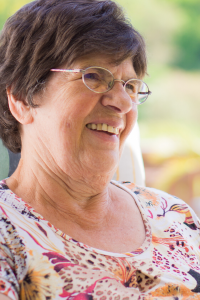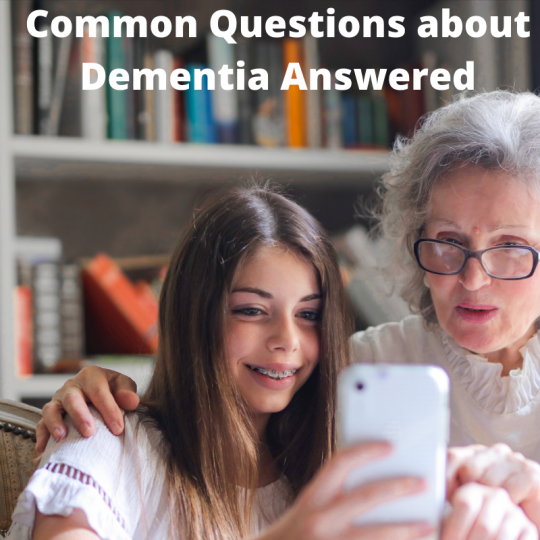As our bodies age, our brains do as well. And every brain ages differently. You may have experienced dementia and other cognitive disorders firsthand with loved ones and family members.
Families may assign a caregiver or make the difficult decision to employ a nursing home for a loved one with the disease. Read on for the answers to common questions about dementia, including symptoms, treatments and how to manage as a dementia caregiver.


Is dementia a normal part of aging?
No. Dementia results from the sum of physical diseases and infection over a lifetime. Nerve cells that have been negatively impacted may not show symptoms until the golden years.
What are the symptoms of dementia?
Dementia symptoms can be mild or severe, depending upon the person.
Expect shifts in
- intelligence
- mood
- perception
A dementia patient will not see the world in the same way they did before the disease presented itself. This group of social and thinking conditions impair
- memory
- judgment
These two vital brain functions can be impaired on a daily basis.
Signs versus symptoms
What a patient experiences are symptoms, while what a doctor sees are signs. A trusted eye understands what dementia looks like. A patient may not be able to describe what they are feeling.
What are some signs of dementia?
Patients may
- repeat themselves
- forget their name
- get lost driving or walking
Signs and symptoms may become more obvious at night. Keep in mind that areas of the brain affected by physical disease vary by patient.
What are the four main diseases that dementia causes?
- frontotemporal dementia
- dementia with Lewy bodies
- vascular dementia
- Alzheimer’s disease
How is dementia treated?
Dementia is treated by adjusting specific brain chemicals.
Medications include:
- cholinesterase inhibitors, such as Donepezil and Galantamine to improve memory retention and retrieval
- Memantine, an NMDA receptor antagonist that works to improve memory and learning
- Antidepressants to improve mood and irritability
- Antipsychotics to treat severe cases of paranoia, hallucinations, agitation and delusions


Therapy sessions may also be introduced to focus on cognition improvement.
How to be a dementia caregiver
There are 16 million dementia caregivers in America. Once a diagnosis is made by a healthcare professional, you must acknowledge your grief and anger that the person you love is going away. The journey may be long, but you must accept it.
First stage
The first stage can last for weeks or years. Acceptance is needed. Instead of fighting the inevitable, use this time to plan. Difficult conversations need to happen with other family members to determine whether you or someone else will be the primary caregiver.
In the first stage, your loved one should still have enough lucidity to make decisions about their care. Meet with lawyers to discuss the power of attorney and wills. If the dementia is progressing rapidly, apply immediately for a conservatorship.
If you are going to be the primary caregiver, make sure to designate secondary caregivers. Emergencies happen, and you will need a few days off every week or month to recharge.
Think of your loved one as a team member. You will be spending a lot of time together and need to get along. As frustrating as it may be to answer the same questions over and over again or prevent them from wandering off, you have to establish a sense of cooperation.
The first stage is mild and can last for years. Keep in mind your loved one is dealing with their loss of independence. They may experience significant sleep problems or mood instability for the first time in their lives.
Provide a strict daily structure as a coping strategy.
Middle stage
Awareness starts to deplete in the middle stage. Seniors may not recognize that they have a habit of repeating themselves. They may also display social inappropriate behavior, such as public nudity or relieving themselves in places other than the bathroom.
Final stage
The final stage is emotionally and financially challenging. Your loved one may need an in-home caregiver because they will experience decreased mobility and may lack the motor skills to feed themselves. This stage can last several weeks or years, but the average is four to eight years.
Communication is quite difficult at this stage. Your loved one may not be able to express themselves. Put on their favorite song, look at photo albums or enjoy each other’s company.
How do I care for myself while taking care of a loved one suffering from dementia?
Every family situation differs. However, you will need to take care of yourself in order to be the best caregiver possible. And if you need some help every day or a few times a week, get it. Every city has reputable adult day care programs.
Day programs help seniors feel social through a multitude of activities. They also give you the opportunity to work or care for small children.
Security
Adult program operators are very aware that dementia sufferers have a tendency to wander off. Staff ratio is increased to give you and your loved one peace of mind.
Transportation
If you need help going to and from the center, most offer transportation for a small cost.
Nutrition
Although seniors with dementia do not require a specific diet, many centers offer a balanced one. Vegetables, fruits, grains and low-fat items can be provided for meals and snacks. However, in the later stages of dementia, too many food choices can overwhelm your loved one. Most centers will offer a limited diet to counteract this.


Socialization
Every human needs to get out of their house and talk to others. Going to a center lifts a senior’s mood. If your loved one is more introverted, a day or two a week should be a great option.
Flexibility
Adult day care programs are usually flexible and are able to meet your scheduling needs. They understand that a senior with dementia might have erratic moods, especially in the middle and final stages. Speak with the director to see which kinds of packages they can offer your family.


Costs
Insurance does not always cover day care. However, Medicaid may pay in part or in full. Seniors who are dually eligible for Medicare and Medicaid may qualify for adult day care and additional services through the Program of All-Inclusive Care for the Elderly (PACE).
To receive FREE phone service, you first must be approved through the National Verifier. You can bring your own phone and keep your number to experience our 5G network coverage. We will ship you a FREE SIM Card Kit so you can get UNLIMITED talk & text if you already participate in government programs such as SNAP and Medicaid. Once approved, you can begin the phone activation process to receive FREE phone service online.
To receive FREE phone service, you first must be approved through the National Verifier. You can bring your own phone and keep your number to experience our 5G network coverage. We will ship you a FREE SIM Card Kit so you can get UNLIMITED talk & text if you already participate in government programs such as SNAP and Medicaid. Once approved, you can begin the phone activation process to receive FREE phone service online.
Q Link Wireless understands that all seniors deserve to enjoy their golden years. With 3GB of data, plus UNLIMITED talk and text, seniors can connect to the world.





